|
|
|
Sort Order |
|
|
|
Items / Page
|
|
|
|
|
|
|
| Srl | Item |
| 1 |
ID:
124429
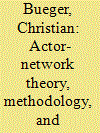

|
|
|
|
|
| Publication |
2013.
|
| Summary/Abstract |
Since its initial formulation in science and technology studies, actor-network theory (ANT) has spread like wildfire throughout the social sciences. Wildfires are fueled by dry and flammable vegetation as well as hot, gusting winds. ANT finds flammable vegetation among those frustrated with many of the conventions, dualisms, and dilemmas of the traditional social sciences. ANT promises to liberate scholars from strict dualisms such as the nature/society divide and the agency/structure dilemma. It claims to open up a reflexive discourse on what constitutes the practice of science. ANT's avant-garde spirit further fuels the fire. Others reject ANT. They (rightfully) lament the often-awkward terminology of ANT, its lack of appropriately defined models and concepts, its literary style of presentation, as well as the radical rhetoric that often comes along with it. For many, the question of what actually constitutes ANT remains mysterious, and it is often unclear whether it is more than a "new materialist" argument for taking objects, things, and technology seriously.
|
|
|
|
|
|
|
|
|
|
|
|
|
|
|
|
| 2 |
ID:
152078
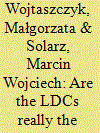

|
|
|
|
|
| Summary/Abstract |
The term ‘the least developed countries’ (LDCs) is widely understood to designate, exactly as stated, the world’s least developed countries. In conjunction with the 2015 United Nations (UN) triennial review of the LDC category, this article attempts to critically evaluate the UN’s list of LDC countries in the light of various indicators – economic, social, political, military and security related, and psychological. It concludes that the official and actual lists of LDCs, despite important similarities, are not completely identical. The term ‘the LDCs’ as used by the UN is therefore not fully consistent with the reality it attempts to designate and describe.
|
|
|
|
|
|
|
|
|
|
|
|
|
|
|
|
| 3 |
ID:
086973
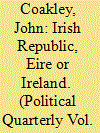

|
|
|
|
|
| Publication |
2009.
|
| Summary/Abstract |
One of the less visible consequences of the Good Friday (Belfast) Agreement of 1998 was that it finally put to rest a fifty year dispute between Ireland and the United Kingdom about the names of the respective states. This article begins by outlining the constitutional background to this complex terminological dispute, and then examines it from three perspectives. The first is that of the Irish state itself, which in recent decades has opted unambiguously for 'Ireland'. The second is the British government, which until the end of the twentieth century preferred the labels 'Eire' or 'Irish Republic'. The third is the militant nationalist republican movement, whose terminology was designed to deny the legitimacy of the existing state. The article concludes by examining the political significance of this issue, arguing that while its most obvious importance is symbolic, it has also had real meaning for the identity and for the geographical definition of the state, as well as for the British-Irish relationship.
|
|
|
|
|
|
|
|
|
|
|
|
|
|
|
|
| 4 |
ID:
024148
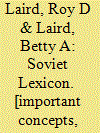

|
|
|
|
|
| Publication |
Lexington, Lexington Books, 1988.
|
| Description |
201p.Hbk
|
| Standard Number |
0669167398
|
|
|
|
|
|
|
|
|
|
|
|
Copies: C:1/I:0,R:0,Q:0
Circulation
| Accession# | Call# | Current Location | Status | Policy | Location |
| 031784 | 947.084/LAI 031784 | Main | On Shelf | General | |
|
|
|
|
| 5 |
ID:
163100
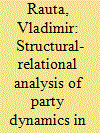

|
|
|
|
|
| Summary/Abstract |
Proxy wars are still under-represented in conflict research and a key cause for this is the lack of conceptual and terminological care. This article seeks to demonstrate that minimising terminological diffusion increases overall analytical stability by maximising conceptual rigour. The argument opens with a discussion on the terminological ambivalence resulting from the haphazard employment of labels referencing the parties involved in proxy wars. Here, the article introduces an analytical framework with a two-fold aim: to reduce label heterogeneity, and to argue in favour of understanding proxy war dynamics as overlapping dyads between a Beneficiary, a Proxy, and a Target. This is then applied to the issues of defining and theorising party dynamics in proxy wars. It does so by providing a structural-relational analysis of the interactions between the above-mentioned parties based on strategic interaction. It presents a tentative explanation of the proxy relationship by correlating the Beneficiary’s goal towards the Target with the Proxy’s preference for the Beneficiary. In adding the goal-preference relational heuristic, the article advances the recent focus on strategic interaction with a novel variant to explanations based on interest, power, cost–benefit considerations or ideology.
|
|
|
|
|
|
|
|
|
|
|
|
|
|
|
|
|
|
|
|
|